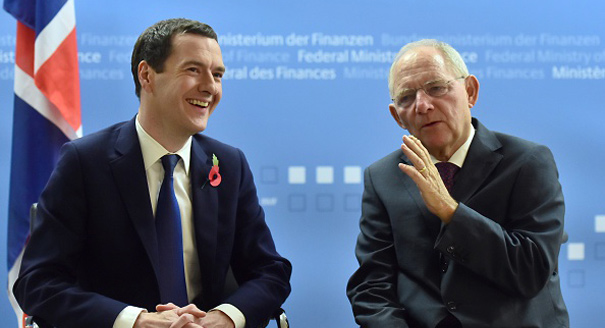The Brexit crisis is revealing the delusions underlying much of Germany’s European policy—on the left and on the right. Take the interview given by Jo Leinen, a member of the European Parliament for the German Social Democrats, to the online magazine EurActiv on June 15. If Britain were to leave the EU, said Leinen, “Germany and France would have to take the initiative to send out a message that, despite the UK’s exit, integration will continue and the concerns of EU citizens will be attended to even more.”
Yeah, right. Among the concerns of citizens across Europe, the juggernaut of ever-closer union ranks pretty high. In the week preceding Leinen’s interview, a poll by the Pew Research Center found that a majority of respondents across ten EU member states did not want further integration but would prefer more powers to be repatriated to their countries’ national parliaments.
Indeed, Britain is by no means the only or even the most Euroskeptic nation in the club: whereas 48 percent of Brits have a negative view of the EU, in Greece, unsurprisingly, it is a whopping 71 percent; in France, which Leinen sees as sending a message that integration will continue, it is 61 percent, in Spain 49 percent, and in the Netherlands 46 percent. Only these people aren’t getting a referendum on EU membership. Yet.
The fact is that a vote for Brexit would encourage Euroskeptics and populists across the continent to demand similar votes. Denmark, France, and the Netherlands are countries that spring to mind immediately, and Austria, the Czech Republic, and Sweden might not be far behind. Yet Leinen says blithely, “I imagine the very opposite of this scenario, where the shock would actually draw us closer together.” And pigs might fly.
Interestingly, and alarmingly for Britain and Europe as a whole, the left-leaning Leinen stands firmly behind the fiscally conservative Wolfgang Schäuble, Germany’s finance minister, on the question of how to deal with Britain if it does vote to leave the EU. “There can be no extra sausages for Britain,” Leinen crowed. “On the contrary: Brexit will have a price for the country; the Brits would have to pay for leaving the EU.”
This irresponsible rhetoric of “Gott strafe England” (“May God punish England”) echoes Schäuble’s remarks in Der Spiegel, in which Chancellor Angela Merkel’s Euro-enforcer said on June 10 that Britain would be locked out of the common market if it left the EU. “In is in. Out is out,” said Schäuble, which is of course nonsense given that his party has long been in favor of offering Turkey a privileged partnership—neither in nor out. That is not to mention the status of Norway and Switzerland; the latter decided in a referendum in February 2014 that it would renegotiate the terms of its relationship with the EU to opt out of rules on the free movement of people.
What Schäuble is doing is not, as some well-meaning interpreters have suggested, stating that Britain would endure some economic hardship if it left the EU. He is, like Leinen, employing thinly veiled threats to keep other EU countries from following Britain’s example.
However, just as Leinen overestimates (to put it mildly) the French appetite for more integration, Schäuble overestimates the power of German threats, especially in a post-Brexit Europe. Even before the Brexit crisis, the European Central Bank was undermining Schäuble’s austerity policies, aided and abetted by the International Monetary Fund on the one hand and by France on the other. Italy is waiting for the right moment to propose big new spending plans for the eurozone, which would finally put paid to the anti-Keynesian consensus that has done so much damage since 2008. Germany would find itself in the awkward position of being the only viable large economy in the EU and condemned to do almost anything to keep the eurozone together.
The non-eurozone member states, meanwhile, weakened by Britain’s departure, would surely fight tooth and nail to protect the opt-outs they have and to keep their options open in case they are forced by their own populists to put their EU membership to a referendum. None of these countries wants to increase German power by bowing to German pressure to punish Britain. “We have ways to make you stay!” does not go down well outside Germany.
To name but two cases: Ireland and Poland, both with huge expatriate populations in Britain, will hardly fight to exclude the UK from the common market if that means their citizens will have to return home.
Similar concerns would drive the three Baltic states to seek an accommodation with Britain. Young people in their Russian-speaking minorities see Britain as a prime destination for work and study. Estonia, Latvia, and Lithuania see this as a safety valve, defusing potential tensions with people who might otherwise become disaffected and turn to the mother country.
Which, finally, draws attention to the gorilla in the room. Playing hardball with Britain before and after the referendum is as shortsighted as attempting ever-closer union against the wishes of large minorities—in some cases, majorities—across the EU. Russian President Vladimir Putin could hardly wish for more.
What the EU needs is to deliver: on jobs and welfare, on democracy and subsidiarity, on border security, and, especially, on solidarity vis-à-vis threats from the East. Russia is exploiting Europe’s crisis; no need to play into Putin’s hands. German politicians need to stop the loose talk and finally get real.
Alan Posener is a writer and columnist for the Welt media group.










